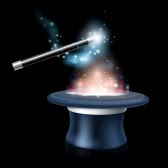Do You Believe in Magic?

What is it about belief, that compels us mere mortals to reject all reason, logic or common sense, let alone science, in pursuit of that which we cannot have, and yet must? Religion, of course, has served to fill this gap in people's lives, and role in their hearts and minds for thousands of years. Religion is a proven provider of sustenance to a certain kind of addiction that seems to afflict most, if not all humans. It is potentially beneficial, of course, as was the probable intent of the prophets and originators in terms of its more positive messages. And of course, like chemical addictions, it is also potentially destructive, and has in fact taken the lives of millions over time, as it continues to do so even today.
Music and art also provide an escape into an alternate state, like religion, and to some (including yours truly) it is a better outlet. When I go to a top-level performance of a Beethoven symphony, or a Bach or Mozart sonata or a Rachmaninoff piano concerto, it is very much a religious experience. And one I can fully experience without being harangued, lectured to, or sent out in braying rage to convert or kill non-believers who might prefer, say, Baroque. Or Beatles (I like both, and wrote a screenplay that was optioned, for the record, three times on this very subject: ROLL OVER BEETHOVEN).
But magic has it's own history as well that is far older than religion. The first signs of magical rites--attempts to change reality for dark or positive purpose--go back 52,000 years to the actual clans of the cave bear, who painted scenes on their cave walls of hoped-for outcomes of the hunt. Virtually all ancient cultures from Greeks, to Romans, to Carthage or Beijing or Troy, all used amulets and other symbolic devices to enhance the outcome of battle, or marriage, or economic or political gain.
Then came religion, around the same time, expanding ritual and symbols and rites to vast mosques and cathedrals and what we have today. Is the dollar a magical talisman? Believe it. Why else would someone give you material goods or services in exchange? And what is that pyramid symbol all about anyway--with that All-Seeing Eye? It predates the Masons by a few thousand years, to the time when the Rosicrucians first emerged in Egypt: the first organized religion.
Which brings me to the present, and the future. Magic, and its religious counterparts are as strong as ever today, with the added elements of technological means, such as computer imaging that give us almost magically transformed experiences seeing movies or playing electronic games: both of which, like drugs and religion, are also addictive.
There is one kind of magic, however, that anyone can practice or participate in, with (almost) complete safety and impunity: reading (and we writers, of course, get to be the priests!). Reading, like all other forms of magic, can be black, or white, or 50 shades of gray in between. It can influence huge masses, like the Bible or Mein Kampf. It can transform lives, like the Chicken Soup series, or any number of thousands of self help books. But the real magic is in fiction, because that remains the only medium in which there are absolutely no limits at all. As the iconic 60's rock group Moody Blues once put it: 'Thinking is the best way to travel.' Reading makes you think, or imagine, and those words will take you anywhere in this world and beyond, to worlds that may be, might have been, or never were but we love anyway. HARRY POTTER, of course, was a synthesis of religion and magic. As was Mary Stewart's wonderful Merlin trilogy, or Tolkien's Lord of the Rings, or even George R.R. Martin's wonderful 'Songs of Ice and Fire' series ('Game of Thrones' and its four sequels to date).
The real magic, of course, is in the writing itself, which is perhaps why so many people now seek to do it. I won't go into qualitative questions, because it is the act itself that is magical. To write fiction is to create something out of nothing, of virtually limitless size and magnificence. It is only the limits of the author's gifts that determine its scope and effect--it's quality, if you will.
In the literary sense perhaps it was Homer who was the first true magician, rendering roughly-hewn tales of historical events into a magical hero's journey replete with monsters, heroes, devils and demons; with perils of god and nature, and a quest that will test the mettle and faith of dozens, hundreds, thousands, and ultimately millions who read and love these tales thereafter.
That's what literature can and should do for you. Take you somewhere you cannot possibly otherwise go; give you the essence of dreams that you cannot possibly otherwise experience; and make things turn out in a way you can only dream about in the real world, but can have at your fingertips in the magical world. Or J.K. Rawling's, or Jack Kerouac's, or anyone who ever wrote something that transported you somewhere just with words. Where else can a happy ending, or simple justice be virtually assured? And that's the best magic of all.


Comments
Post a Comment